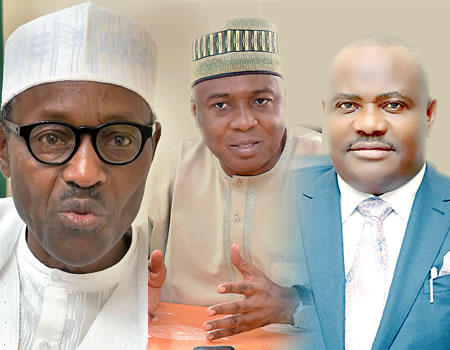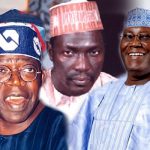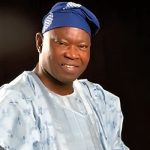Who are the forces behind the mega party? How far can they go in their mission to supplant the ruling party? Senior Deputy Editor, TAIWO AMODU unravels the gladiators behind the emerging platform and the hurdles before them.
IT is an open secret that politicians across the party divides are engaged in intense discussion towards a political realignment that will culminate in the formation of a formidable mega party, to challenge the ruling All Progressives Congress, (APC) in the 2019 general election.
Though the general election is still over two years away, political actors are known to be vigilant, never willing to give anything to chance. Soon, the struggle for the leadership mantle in 2019 might soon take a centre stage and governance may soon give way to brazen campaigns for elective offices. With the idea of another coalition of political parties to challenge the ruling party already in the air, informed political watchers have begun to examine the likelihood of what has been described as a mega party that will aggregate different forces, power blocs and influential politicians from across different parties and geopolitical zones. The only difference between the budding idea of a mega party and the ruling party it stands to challenge, however, for now, appears to be the methodology of the forces behind the former.
Unlike the chieftains of the coalition of political parties that metamorphosed into APC, who were anxious to market and galvanise support for it, those behind the unfolding arrangement are, at present, in self-denial.
In the beginning
The present ruling APC was an amalgam of four opposition parties and certain aggrieved chieftains of the erstwhile ruling party, the Peoples Democratic Party (PDP). It was made up of the defunct Action Congress of Nigeria (ACN), the Congress for Progressive Change (CPC), the All Nigerian Peoples Party (ANPP) and a faction of the All Progressives Grand Alliance (APGA) led by Imo State governor, Rochas Okorocha. Leading the breakaway PDP, later christened the New PDP group was the former governor of Sokoto State, Aliyu Wamakko; his Rivers State counterpart, Rotimi Amaechi; governors of Kwara, Adamawa and Kano states, Abdulfatah Ahmed, Murtala Nyako and Rabiu Kwankwaso.
Former vice-president, Alhaji Atiku Abubakar later swelled the ranks of defectors from the PDP. Notwithstanding what the politicians say, politics is largely about distribution of party patronage. With the victory of the APC, in the 2015 general election, unprecedented in the history of nerve-racking politicking in the country, the tendencies that coalesced to form the new ruling party started retreating into different camps and the initial complaints in hushed tones, soon became loud and clear: That Buhari’s men from the CPC are the ones calling the shots. With Muhammadu Buhari as president, his CPC also produced Secretary to Government of the Federation (SGF), Mr Babachir Lawal. To run the president’s kitchen cabinet were his nephew, Mamman Daura and his Chief of Staff, Abba Kyari.

Sunday Tribune gathered that the like of former Ekiti and Lagos states governors, Dr Kayode Fayemi and Babatunde Fashola, as well as the former National Publicity Secretary of the APC, Lai Mohammed, to the Federal Executive Council, (FEC) were picked by Buhari himself.
Former Vice-President Abubakar was also left in the cold, as he was not given any ministerial slot. Checks revealed that with the exception of former Kwara state governor, Senator Bukola Saraki, who dared the Presidency and the party leadership and fought a fierce battle to emerge as Senate President, only former Rivers State governor, Amaechi, has a good narrative to tell among all of those who stuck out their necks in the battle to unseat the PDP.
While the national leader of the party and former Lagos State governor, Senator Bola Tinubu, Atiku Abubakar and Wamakko and Kwankwaso continued to lick their wounds, Amaechi was to emerge as Minister of Transport and Aviation; a former Information Commissioner in his cabinet, Ebim Sementari was announced as acting Managing Director, Niger Delta Development Commission (NDDC); his candidate for the Rivers State governorship election, Dakuku Peterside got the juicy portfolio of Director-General of Nigerian Maritime Administration and Safety Agency (NIMASA) .
Following what informed watchers of political developments have described as the sidelining of hitherto powerful blocs in the APC, coupled with the topsy-turvy in the PDP, the big gang-up ahead of 2019 general election had, therefore, begun in earnest, with those alienated from the corridors of power holding meetings, albeit away from prying eyes of security agencies. The influences, said to be strategising on how to regain lost grounds and ultimately, supplant the Buhari administration, Sunday Tribune gathered, have become varied but united by a sole determination to bounce back to power.
Those with presidential aspirations among them have since revived their structures.
Further checks revealed that forces behind the emerging mega party were, indeed, larger than the alienated or disgruntled stalwarts of the ruling APC. In the unfolding arrangement are former Oyo state governor and financier of the Accord Party, Senator Rasheed Ladoja and certain chieftains of the APGA, which refused to join forces with Okorocha in those uncertain days when APC was at its formative stage. Last year, former Information Minister and APGA governorship candidate in Nasarawa State in the last election, Labaran Maku and Bianca Ojukwu, widow of the late Ikemba Nnewi, Odumegwu Ojukwu, led a delegation to the residence of Ladoja at his Ibadan residence.
In the new coalition is the PDP faction led by Senator Ahmed Makarfi. A startling revelation that it was involved in the new deal was the recent declaration by the former Kaduna State governor that his faction of the party was considering the possibility of merging with other political parties ahead of 2019 general election. Speaking while inaugurating a 115-member strategy review and inter-party affairs committee saddled with the assignment, Senator Makarfi said the reason behind the alliance was part of the party’s strategy to return to power in 2019 through every democratic means.
According to Makarfi, the committee led by former Minister of Information, Professor Jerry Gana, was to, among other things, “explore strategies to engage all possible allies, with a view to building positive relationship in overall interest and in furtherance of democracy in Nigeria.”
He said further: “You don’t remain docile and inactive; you don’t remain cornered so that you will not be toyed with at the whims and caprices of anybody. Time is going, a lot of things are happening and our men and women are on their own and are beginning to do all sorts of meetings.
“However, if you don’t bring all your flocks together to talk as one family, before long, a good chunk of them would have gone on their own, because nobody will remain inactive for forever.”
Makarfi said that “after due consultation, we felt that time is now right to set up a committee, called strategy review and inter-party affairs committee. The strategy is how to come back to power in 2019 through every democratic means. Even as caretaker committee, we get approached by various groups and we felt that it is not the few of us that should be talking to these people.”
Before the declaration by Senator Makarfi, Ekiti State governor, Ayodele Fayose, had given indication that he and his followers might pick a new platform and not the fractured PDP for the 2018 governorship election in the state.
2019 Presidency: Conflict of interest?
In the vanguard of the unfolding platform are certain politicians whose presidential ambitions are not hidden. Leading the list is the unrelenting former Vice-president, Abubakar and former Kano State governor, Rabiu Kwankwaso. The Turaki Adamawa was the presidential candidate of the defunct Action Congress in the 2007 presidential election and also lost the PDP ticket for the 2011 presidential race to former president, Dr. Goodluck Jonathan. He came third behind Rabiu Kwankwaso in the keenly contested primaries for the APC presidential ticket for the 2015 general elections.
It is unlikely that the former vice-president would let go easily the ticket for the 2019 race. With the Ahmed Makarfi faction of the main opposition party in the mix, other likely contenders for the ticket may include former Jigawa State governor, Sule Lamido and the sitting governor of Gombe State, Ibrahim Hassan Dankwanbo.
Though Lamido had since denied any involvement in the mega party arrangement, as he claimed that the PDP remains a viable platform for him to challenge the ruling APC in the 2019 presidential race, Sunday Tribune, however, gathered that wise counsel might prevail and the presidential ticket of the mega party may likely be zoned to the North-West geopolitical zone of the incumbent president, Buhari. Dankwanbo and Atiku are from the North-East geopolitical zone.
Atiku, Tinubu react
Leading chieftains of the ruling party who had been mentioned as rallying forces in the unfolding mega party deal had also since denied involvement in the unfolding arrangement. Speaking with Sunday Tribune by phone, Paul Ibe, media aide to former Vice-President Atiku, dismissed insinuation of his boss’s membership of any mega party.
He said: “The former vice-president remains a major stakeholder of the APC and any insinuation of his membership of another party should be discountenanced. It needs restating that the media office of the Turaki Adamawa had last year issued a statement to that effect.”
Tinubu equally denied his alleged engagement with any group of politicians to supplant the ruling APC.
In a statement made available by his media office last December, the national leader of the APC vowed to remain in the party, as he noted that he would not abandon the platform he laboured with others to build.
“In our journey to national betterment, plans and policies will be made, then amended. Mistakes will occur and then corrected. Achievements will be recorded and replicated. Through it all, I, Asiwaju, will remain true to the progressive ideals that fuelled the creation of APC,” the statement said.
Tinubu further said: “I have devoted my political life to achieve what has been achieved. My heart is too much of the people and my mind too fixed on establishing positive historic legacy… rather than engage in destructive pettiness. This government of APC is for the betterment of the people and the national purpose is bigger and more important than any individual’s desires.”
But politicians and discerning Nigerians who saw what played out in the Ondo State governorship election were bemused over the former governor’s claim of total devotion to the party and its government.
However, apparently basking in the euphoria of its victory in the recent Edo and Ondo states governorship elections, national chairman of the ruling party, Chief John Odigie-Oyegun, declared that the party was not threatened by the formation of a “mega party” ahead of 2019. He said the APC was rather focused on its mission, which had been made difficult by the current economic situation worldwide.
Oyegun, in a recent interactive session with newsmen, said those behind the formation of the mega party should be encouraged in order to have a formidable opposition to the ruling APC.
He, however, absolved certain leaders of the APC of being behind the formation of a new party.
“We don’t feel threatened at all. No mega party will survive the APC; I don’t know where the name mega party suddenly came from in the lexicon of politics in this country. We will, in fact, encourage a mega party, because with the gradual collapse of PDP, we want a party that can make us sit upright and be on our toes in terms of delivery of services to our people; a party that will make us feel challenged, that will make democracy real and offer the people a real choice. We are not threatened at all.”
But while the APC party leadership maintains its indifference to mega party deal, Sunday Tribune checks revealed that the ongoing trouble shooting efforts in the South-West and North-West geopolitical zones were aimed at placating aggrieved leaders of the party so as for them to sheathe their swords and restate their individual commitment to the party.
How the peace efforts will restore amity, which has taken flight in the ruling party and dissuade those determined to abandon the platform, however, remains to be seen. Where will the PDP end up in its ongoing roller-coaster ride? Which platform will serve several influential political blocs who appeared to be currently in the cold across the geopolitical zones? Which party will provide the alternative to the APC amid the fears of the country gradually becoming a one-party state? These and many more questions have remained germane as the mega party blues continue to play albeit in low tunes across the country.






